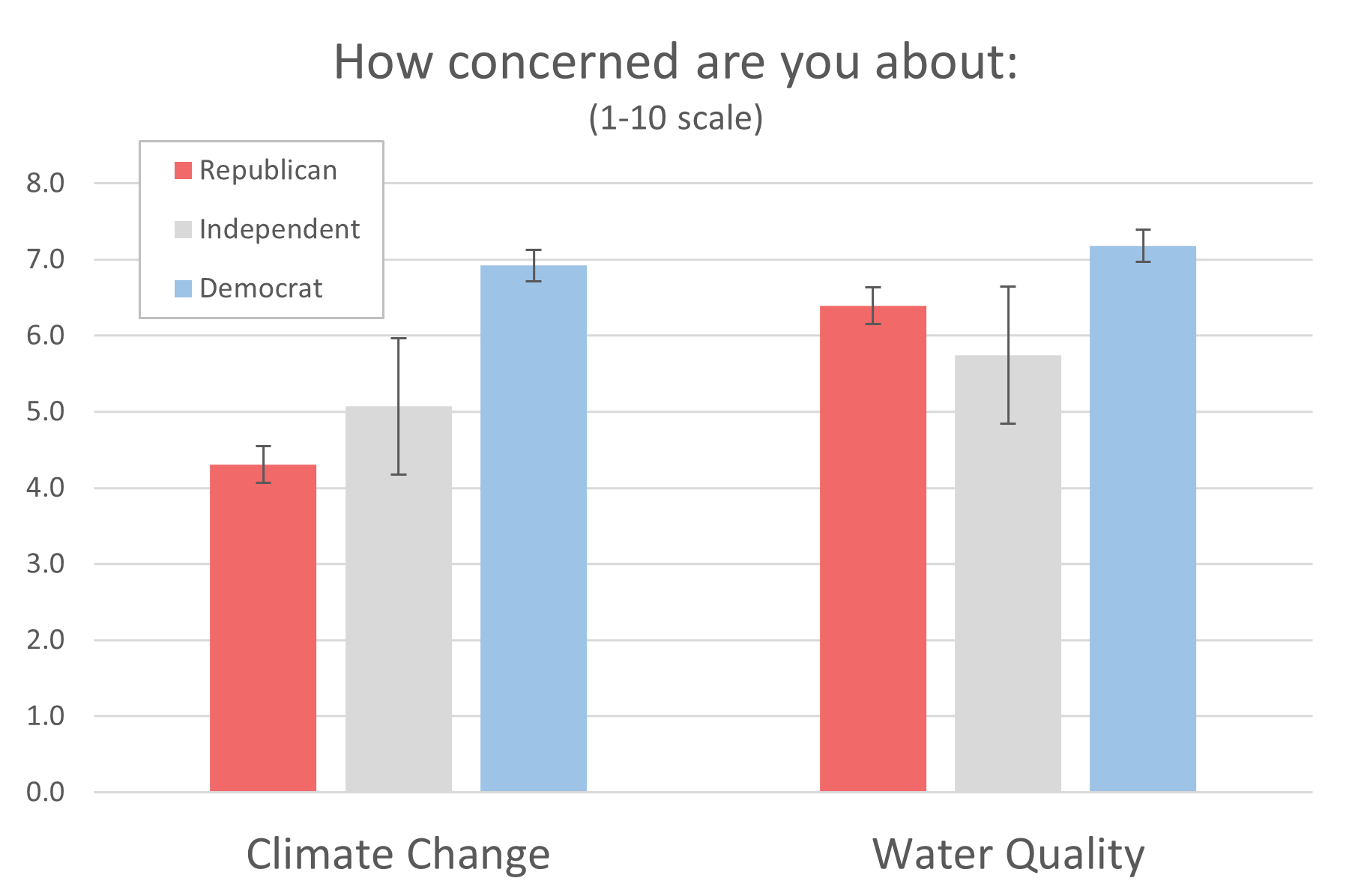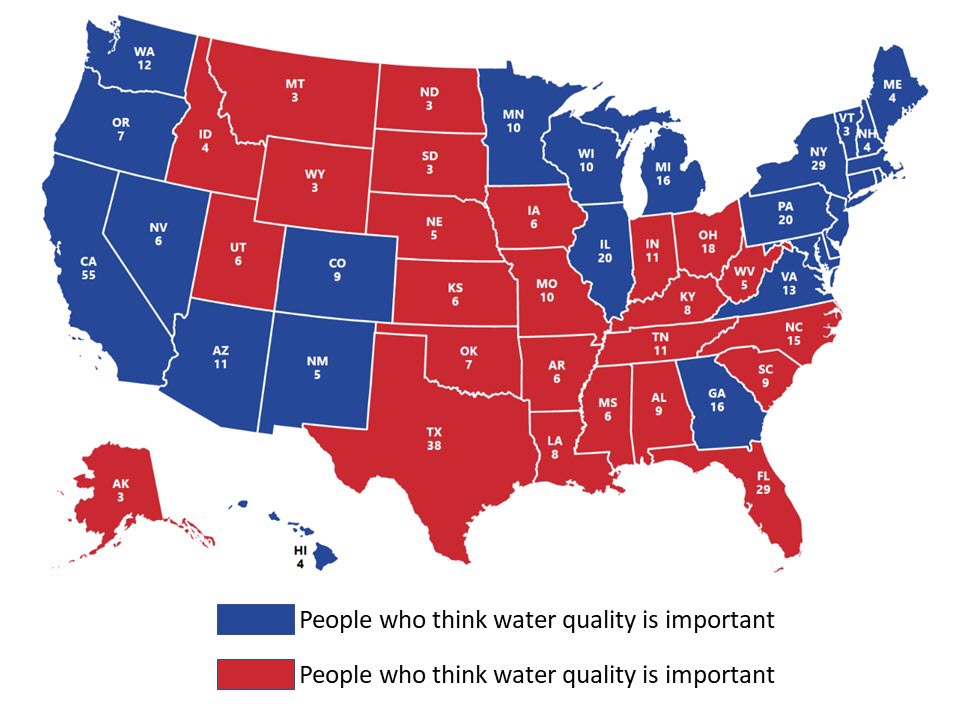Why water should be the Biden Administration’s top environmental priority
The Biden administration’s environmental policy priorities are likely to be quite different from the Trump administration’s, and the impending change at the White House has visions of sweeping new federal greenhouse gas policies dancing in environmentalists’ heads. But sober political observers know that the prospects of significant climate policy—let alone a Green New Deal—are virtually zero so long as Republicans maintain a majority in the Senate.* A trillion-dollar infrastructure and/or bailout package for local water infrastructure are also probably non-starters. Those are going to be bitter pills for many of the President-Elect’s supporters to swallow. It’s also why the Biden administration should make water, not climate, the centerpiece of its environmental agenda when it takes office in January.
Everybody cares about water
Once upon a time, environmental protection wasn’t an especially partisan issue. Indeed, most major milestones in U.S. environmental policy were signed into law by Republican Presidents.** But over the past 40 years environmental policy has become increasingly partisan at the national level, with Democrats widely perceived as more protective and Republicans less protective of environmental quality. Perhaps the most divisive environmental issue of all is climate change. When global warming entered the national political consciousness in the early 1990s there wasn’t much difference between partisans on the issue. A generation’s worth of general party polarization has changed all that, however, and today Democrats and Republicans are deeply divided even over the basic facts about climate policy. Today climate policy is nearly as divisive as abortion or guns in our national politics. Environmental activists clammor loudest for a big federal greenhouse gas program, but it is difficult to imagine any major legislation branded as a “climate” bill clearing the Senate’s 60 vote hurdle with so many red states lined up against it.
Water is different. It seems that radical polarization hasn’t yet contaminated our most essential resource. Unlike climate threats, where risks seem distant and causal linkages uncertain, risks to water quality are immediate, the causes known, and the effects tangible. It’s no coincidence that the partisan divide on water is much narrower than it is on climate. A few years ago, I helped the Texas A&M Institute for Science, Technology, and Public Policy run a national public opinion survey on environmental issues. We asked respondents to rate their level of concern about issues on a 0-10 point scale, with 10 meaning “extremely concerned” and zero meaning “not at all concerned.” As you’d expect, we found consistent partisan gaps across issues. But one really striking finding stood out to me and has stuck with me ever since. Check this out:
The public opinion gap between Democratic and Republican concern is greatest for climate change and smallest for water quality.† What’s more, the average Republican falls on the “not concerned” end of the spectrum on climate change (4.3), but well into the “concerned” range on water (6.4). On reflection, that result shouldn’t be surprising: Republicans like to drink water and flush their toilets just as much as Democrats do, and I’d guess that a good number of America’s hunters and sportfishermen tend to vote with the GOP.
What’s more, the nation’s most severe drinking water, water pollution, and infrastructure affordability problems are in rural America. Big cities like Flint, Detroit and Newark tend to get the most attention from reporters and politicians, but the water challenges of rural communities are in many cases much more daunting.Joe, Kamala, and the 117th
These political conditions are ripe for a bipartisan, urban-rural coalition to improve the nation’s drinking water and water quality. Rather than beating their heads against the stone wall of a GOP Senate in vain pursuit of climate policy, the Biden Administration ought to focus its legislative efforts on systemic reforms to improve the water sector. Vice President-elect Harris has been working on water issues actively since joining the Senate, so she’ll come into office with some expertise on the issue and is poised to be an effective champion. Major legislative victories in the 117th Congress won’t come easy for anyone, but water policy offers perhaps the best chance to get something big done on the environment.
And guess what? It turns out that lots of the things we do to protect water quality (e.g., aquifer protection, watershed management, wetland restoration, sustainable agriculture, etc.) also reduce greenhouse gas emissions and mitigate climate change impacts. So a big victory on water policy would be a big victory for climate policy, too.***
*It’s technically possible for Democrats to pull even in the Senate with a sweep of Georgia’s special Senate elections. New Vice President Harris would then break the leadership tie and give Democrats control of the 117th Senate. My political science spidey sense tells me this is an unlikely scenario.
**Lincoln created the first national park when he signed the Yosemite Grant Act in 1864. Theodore Roosevelt established the U.S. Forest Service, signed five more national parks into law and established 19 national monuments. Nixon established the Environmental Protection Agency and signed the Clean Air Act. Ford signed the Safe Drinking Water Act and RCRA, and Bush41 championed the 1990 Clean Air Act Amendments that created the first cap-and-trade system for managing air pollution.
† These partisan gaps remain in regression models that control for age, gender, race, ethnicity, and income.
***Just don’t say that part out loud in red states.



